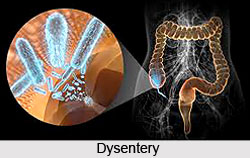 Dysentery is a serious condition affecting the large intestine caused by two organisms, protozoa and bacilli. The former is generally known as amoebic dysentery and the latter as bacillary dysentery. An attack of amoebic dysentery is milder in comparison with bacillary dysentery. But while bacillary dysentery can respond quickly to treatment, amoebic dysentery is very difficult for the patient to get rid of this dysentery.
Dysentery is a serious condition affecting the large intestine caused by two organisms, protozoa and bacilli. The former is generally known as amoebic dysentery and the latter as bacillary dysentery. An attack of amoebic dysentery is milder in comparison with bacillary dysentery. But while bacillary dysentery can respond quickly to treatment, amoebic dysentery is very difficult for the patient to get rid of this dysentery.
Dysentery is characterized by inflammation and ulceration of the bowel, which is a colic pain in the region of the abdomen and passing of liquid or semi-formed stools with mucus and blood.
Symptoms of Dysentery:
Dysentery may be acute and chronic. The symptoms of each of them are as follows:
Acute Dysentery:
•This is characterized by pain in the abdomen, diarrhoea and dysenteric motions, where yellowish white mucus and sometimes only blood from the intestinal ulcers passes with stools.
•Pain and tenesmus precede the evacuations.
•The patient feels a constant desire to evacuate, although there may be nothing to throw off except a little mucus and blood.
•There is a feeling of pain in the rectum and along the large intestine.
•With the advance of the disease the quantity of mucus and blood increases. Occasionally icasts or shreds of skin like mucous membrane, from small fragments to about 12 inches in length and an inch wide, are seen to pass out with motions. Sometimes pus is also thrown out with motions and often the smell of the stools becomes very unbearable.
•All the digestive processes are upset and secretions are changed or stopped.
•The saliva becomes acidic instead of being alkaline and the gastric juice itself may become alkaline.
•The stomach loses power to digest and absorb food. The bacilli create toxins and the faecal matters formed also increase the further manufacture of toxins and their consequent absorption in blood.
Chronic Dysentery:
•Chronic cases are after-effects of acute attacks, where the patient does not recover completely.
•The stools remains putrid and may contain blood, while diarrhoea and constipation may alternate, and general health is disturbed.
•In severe cases, the temperature may also rise. It may occasionally become subnormal also.
Causes of Dysentery:
The cause of dysentery, according to modem medical system, is germ infection, since the latter develop in the colon as a result of putrefaction of excessive quantities of animal protein food, fried substances, over-spiced foods and hard to digest fatty substances. However, the real cause of dysentery is the dietary indiscretion and eating of excessive amounts of flesh food in hot weather or tropical climate unsuited to the digestion of such foods. Other causes also include debility, fatigue, chill, lowered vitality, intestinal disorders and overcrowding under unsanitary conditions.
Treatment of Dysentery by Nature Cure:
The treatment of dysentery aims at:
•Removing the faecal and toxic matter from the intestines
•Alleviating the painful symptoms
•Stopping the virulence of the bacteria
•Promoting the healing of the ulcer.
Here are a few treatments to go ahead with treating this disease in its acute form.
•The patient should fast as long as acute symptoms are present, where he should intake only orange juice and water. Alternatively, the patient should also subsist on buttermilk till the acute symptoms are over, since buttermilk combats offending bacteria and helps establishment of helpful microorganisms in the intestines.
•The patient may also be given small doses of castor oil, since this acts as a mild prerogative and facilitates quicker removal of offensive matter, minimizes the strain during motion and also acts as a lubricant to the ulcerated surfaces.
•The removal of accumulated poisonous matter should be attempted by giving very low-pressure enema, twice or thrice daily.
•The patient should also take complete bed rest as movement induces pain and aggravates distressing symptoms.
•A hot water bag may also be applied over the abdomen.
Chronic Form of Dysentery:
•After the acute symptoms are over, the patient may be allowed rice, curd, fresh ripe fruits, especially banana, pomegranate and skimmed milk.
•Solid foods should be introduced very carefully and gradually according to the pace of recovery, however avoided flesh foods of all kinds as far as possible.
•Other foods, which should be avoided are tea, coffee, white sugar and white flour and products made from them as well as alcohol in all forms.
•The use of pomegranate rind is another effective remedy for dysentery. About 60 grams of the rind should be boiled in 250 grams of milk. It should be removed from the fire when one third of the milk has evaporated. It should be administered to the patient in three equal doses at suitable intervals.
•Lemon juice is very effective in dealing with ordinary cases of dysentery. A few lemons, peeled and sliced, should be added to 250 ml. of water and boiled for a few minutes and this should be strained and taken thrice daily.
•Other remedies considered useful in the treatment of dysentery are the use of small pieces of onions mixed with curd and equal parts of tender leaves of the peepal tree, coriander leaves and sugar chewed slowly.




















